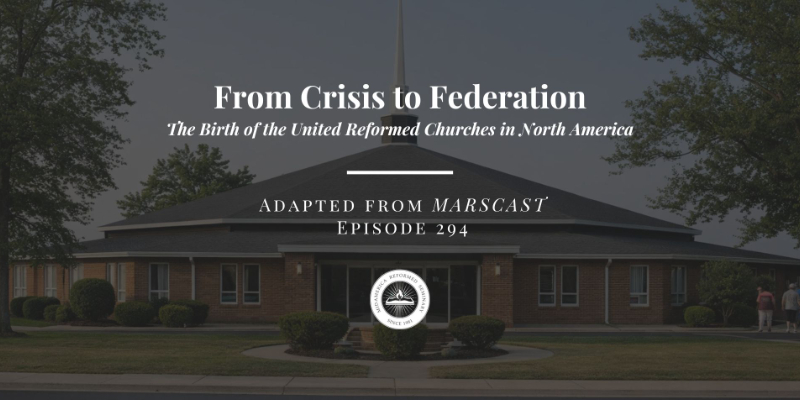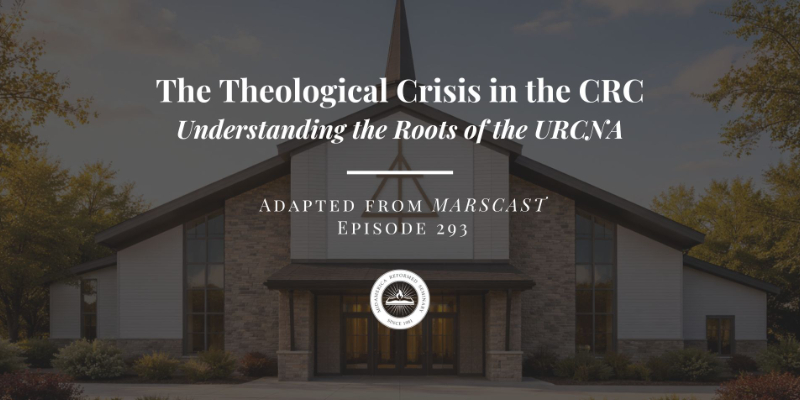
In-Person Theological Education
In a day when many seminaries are expanding their programs to include online degree offerings, I am so thankful to God for the things I learned at Mid-America that only a residential education could have taught me. The professors who taught me, and the students who I sat with in class, challenged me in areas that I needed to be challenged; they taught me how to “disagree agreeably,” as a churchman; and they formed me not only as a student of the Word but as a Christian, and as a pastor. Coming into the reformed tradition as an “outsider,” I had done a lot of self-study and had come to many of my own theological conclusions – some of which were more “fringe” or minority views within the reformed tradition. And, had I pursued online training (as I considered, and, for a time, even did), I fear those views would not have been sufficiently challenged in the ways that they needed to be. To be sure, I could have listened to lecture material that would have challenged some of my theological convictions. But even though online lectures might have exposed me to alternative viewpoints, I would have been engaging with those in the privacy of my own mind, and would have been free to simply shrug them off (indeed, I think I would have). Residential education, on the other hand, forces you to process things in community. I was free to disagree with my professors or classmates, but the communal nature of residential education forced me to defend why I disagreed.
I am afraid that many, like myself, who have come into the reformed tradition from outside of it – and who receive most of their theological formation through podcasts, blogs, and authors of their own choosing – who then go on to pursue seminary education at a distance, will miss out on this vital aspect of theological formation. Self-study leaves too many holes, and it doesn’t provide the kind of pushback that these types of students (like myself) need.
My professors saw my weaknesses and my blind spots, and they challenged me in ways that I needed to be challenged. As a result, certain convictions that I held with gusto as a first-year seminary student, I held more charitably by my second year, and perhaps not at all by my final year. Mid-America exposed me to a more broadly and classically reformed education than I would have received had I been able to pursue the kind of self-study that many distance education programs offer.
I understand that even online degree programs have their students engage in online discussion forums and the like, but there is something very different between hashing out disagreements online and doing so in person (just peruse any Facebook comment section for evidence of the way that people interact differently behind a screen than they do in person). Gospel ministry is in-person, and God used the real in-person interactions with my professors and classmates to polish and soften me in the ways I needed to be polished and softened.
This leads to a second reason why I’m thankful for the in-person education I received at Mid-America: our professors very intentionally taught us to “disagree agreeably.” They taught us, in the midst of our discussions and disagreements, to behave like churchmen. Whether it was in our ethics class, learning about differing views on how to apply certain theological principles to difficult real-life situations, or New Testament background, dealing with manuscript traditions and they constantly reminded us: “You are going to go to classis, or presbytery meetings, and will interact with brothers who hold different theological positions on these matters.” And our professors were careful to prepare us to engage in those debates with kindness, composure, and charity, treating our fellow presbyters as “fathers and brothers” (1 Timothy 5:1), and avoiding the youthful passions that often lead to foolish controversies that are not characterized by gentleness (2 Timothy 2:22-25).
In a day and age where the church is marked by schism and division, one valuable way to witness to the world around us of the transformative power of the gospel is to engage charitably in our disagreements. One author recently (sub)titled his book on this topic: How to Keep Calm and Stay Friends in Hard Conversations. Residential education at Mid-America taught me how to do this. This has been an invaluable lesson not only at classis meetings and synods, but in the consistory room, or on pastoral visits. Our professors gave us the tools to behave like churchmen in the midst of our disagreements, and, even more importantly, they modeled this for us (which is another benefit of in-person education: simply being able to watch your professors live out the convictions that they are seeking to instill in you).
And when we fell short of the standard that they called us to, these professors were able to lovingly and pastorally correct us. This is a third reason why I am grateful for the in-person education that I received at Mid-America: there is a spiritual formation component to residential studies that simply cannot be replicated online. Our churches learned this lesson during COVID (i.e., that online engagement and the production of material for our members to consume are not the same things as the fellowship of the saints). Spiritual formation takes place in person. It takes place through the coffee discussions after class, through time in prayer with your professors both formally and informally, and through meals shared together.
Our professors pastored us from the lectern. They applied the contents of their lectures (whether in Old Testament or church history) to our worries, fears, and sins. They got to know our families. They truly cared for us. And now, even six years later, they continue to do so. When I have a question pastorally, they are quick to reply. When they are preaching in the area, they are quick to set aside time to spend with us. They continue to provide pastoral counsel and spiritual formation.
As Paul House has said, “Incarnational [i.e., in-person] seminaries do not simply give their graduates certificates and diplomas and send them off with good wishes and contact information for the development office. They continue to offer resources and face-to-face counsel for improved ministry, and they visit the lonely.” And “from close contact with graduates in their churches, incarnational seminaries also have the privilege of learning how to prepare future generations of pastors” (Bonhoeffer’s Seminary Vision, 179). This is true of Mid-America.
And all of this is vital for the formation, and ongoing formation, of ministers of the gospel. We need to be concerned not just about producing theologians, but about producing pastors. And this kind of pastoral formation (as in the church) takes place in person. Even as Paul said, “Brothers, join in imitating me, and keep your eyes on those who walk according to the example you have in us” (Philippians 3:17), our professors did the same (and continue to do the same). They invited us to observe both their doctrine and their life (1 Timothy 4:16) in a way that simply could not have been done online. Nor could they have been able to speak to our weaknesses and blind spots the way they did without getting to know us in real life. Spiritual formation takes place in the context of relationship, and it’s vital that our future pastors be formed as such.
In a day and age where we hear all too frequently of disqualifying sins from church leaders, or of an argumentative spirit that leaves them open to charges of spiritual abuse, I am f irmly convinced that one of the ways we can best provide the church with gentle shepherd-leaders is through the spiritual formation that takes place in the context of in-person theological education.
This kind of education polishes us theologically in ways that we need to be polished, providing theological formation; it teaches us to disagree agreeably, providing interpersonal formation; and it forms us through face-to-face contact with pastor-professors who know us and love us, providing spiritual formation. For all of these reasons, I am grateful to God for my education at Mid-America.
And though I studied not far from my own home, so this doesn’t apply so much to me, perhaps one other reason for the superiority of in-person education is what we might call pilgrim formation. That is, it uproots us from our homes in a good way and reminds us that this world is not our home. One of the most compelling arguments often made for distance education is that it allows you not to uproot your family and move across the country. But what if such a move was actually a good thing? What if part of the design was that moving away to study in a faraway place for local church ministry prepared men to be more willing to move again when called to local church ministry? One of the benefits of residential seminary training is that it forces future ministers to relocate, thus loosening their roots, and preparing them to consider moving to faraway places (perhaps like Canada, where the URCNA has many vacancies).
There was a time when men seemed to be more willing to consider taking calls to far-off, and less “convenient” places; and one wonders whether the rise in more convenient models of pastoral training has not contributed to a resistance to making inconvenient moves for the sake of the ministry. As Chad Van Dixhoorn has written, “One of the benefits of in-person seminary education is that it loosens our roots, and often transplants us… In-person classes usually require a move. And once someone has taken the baby-step of temporary relocation, they become a little more open – and a little better prepared – to contemplate the giant step of campus ministry on the other side of the country, church planting in a needy state, or missionary service on a foreign field” (“Send Them to Seminary” Reformation 21).
For all of these reasons, I am thankful to God for the in-person theological education I received at Mid-America. Studying with men from all over the world created a culture of being willing to relocate, and has also provided us with ministry friends for years to come. The mentorship of our professors formed us spiritually. And the communal nature of our learning more than doubled the impact of the things we learned. I realize there may be a place for distance education in certain emergency situations (or as a supplement to in-person training). But I, for one, am grateful for Mid-America’s commitment to in-person learning and pray that many more men considering gospel ministry would not opt for the more convenient path of online learning, but for the greener pastures of residential pastoral formation.

Rev. Ryan Swale is a 2019 graduate of Mid-America, and pastor of Immanuel United Reformed Church in Jordan Station, Ontario, Canada
Recent articles




